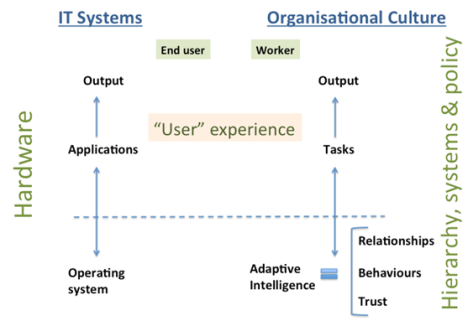
“This planet came with a set of instructions, but we seem to have misplaced them. Civilization needs a new operating system.” ~Paul Hawken
Pressure Test
Here is a quick test to help you understand both emotional and analytical thinking.
What do you normally do when your computer has a glitch and that box pops up inviting you to “report the problem?”
- Do you hit the “yes” button and dutifully wait for the computer to do its analysis and send the message?
- Or do you hit “no” knowing this issue will rear its ugly head again soon?
There’s complex emotional and analytic thinking behind this decision that is analogous to dealing with annoyances in our working lives.
For example, if you hit “no” you’re deciding that although annoying its a small distraction compared with the important task at hand. However, if you’ll need to follow the same procedure and get the same bug you’re more likely to hit “yes”. You might also consider this to be the software provider’s responsibility; “why should I do their job for them.”
(Mind you if everyone hit “no” the consequence of this global “e-silence” is the bug never gets fixed…)
We have the same basic choices with our problems at work. Do we do something about them or put up with it stoically? If enough people fail to report the problem it festers creating an invisible block to personal and organisational effectiveness, competitiveness and eventually achievement.
Sharing Important Information
The power and impact of sharing information was described eloquently by Gen. Stanley McChrystal in his TED Talk. – The military case for sharing knowledge.
“Sharing is power” ~Gen. Stanley McChrystal
[ted id=1992]
All organisations have limited human, financial and physical resources and must prioritise. For a problem to get over their attention threshold and trigger a response, a certain number of “complaints” must be received.
Managers decide how urgent/big the problem is and determine a response. In other words every user has 100% responsibility over error reporting and the organisation has 100% responsibility for its response.
This is a classical trust-based dynamic relationship.
When it’s working really well, a cultural operating system grows stronger iteratively from the power its crowd feeding back.
A Cultural Operating System
Microsoft’s Windows OS and Apple’s Mac OS are akin to a command and control-based management system where the end-user/staff has modest input.
Whereas, Linux, the epitome of an iterative open source process, is similar to a flat organisational system.
How would an iterative cultural operating system based on the concept of Adaptive Intelligence underpin effectiveness and success?
In “The practice of Adaptive Leadership”, Heifetz, Grashow and Linsky describe Adaptive Leadership as, “an iterative process involving three key activities:
1) Observing events and patterns around you
2) Interpreting what you observe
3) Designing interventions based on 1 & 2.”
I have added some steps to include:
4) Observation of the effects of interventions
5) Flexing interventions to give optimal positive results (Fig. 1).
Fig.1. A dynamic adaptive positive feedback cycle

Adaptive Intelligence
Adaptive Intelligence (AQ) is the dynamic expression of our Analytical Intelligence (AQ), Emotional Intelligence (EQ) and Positive Intelligence (PQ = internal motivation).
The exact flavour of AQ we deploy needs to be flexed to fit any given changing situation we experience. Operating from imbalanced IQ, EQ or PQ creates inappropriate responses based on habit.
If you want to use more of your AQ become more authentically aware of yourself and others.
Organisations need to develop deeper and broader corporate self-awareness. As a first step you might invite everyone to hit the social equivalent of the “yes” button whenever they observe problems or they have potentially good idea. This virtuous process relies on everyone believing they have influence, will be heard and their input valued and acted on.
This resonates with our software analogy nicely (Figure 2.).
Fig. 2 Comparison of computing and organisational operating systems.

Enhanced AQ
Enhanced AQ is delivered by:
- Raising individual and organisational awareness
- Transparent communication
- Authentic trust
- Objective measurable action.
It is powered by curiosity and authentic feedback and founded on 100% personal responsibility.
Stifled AQ
Poorly functioning AQ-based cultural operating systems are recognised from symptoms including:
- Poor recruitment
- High staff turnover
- Conflict
- Absenteeism
- Poor staff engagement
- Missed opportunities/deadlines
- Inability to create trends and compete effectively
Long lasting symptomatic improvement comes from paying persistent attention to your cultural operating system (AQ). You keep a healthy AQ system going by constant vigilance, bug fixes (e.g. removing stupid rules), cultural upgrades (e.g. wellbeing-based cultures) and inviting everyone to be more curious about their daily working lives (See – How To Use Your Daily Story As A Powerful Seminar For Achievement).
Flexible Open System
An adaptive iterative cultural process equips leaders with high quality dynamic information as well as the authentic human perceptions which create exciting visions and sustain meaningful change.
Thoughts for today
- How often do you look under the hood of your organisation’s cultural operating system?
- Notice to what extent your organisation’s culture relies on its corporate hardware (hierarchy, IT, systems & policies) compared with software (culture & people).
- How much attention and time do you devote to awareness raising efforts for you and your staff?
- Do you have a flexible open system for all staff to report problems and ideas?
- Do you have an adaptive iterative cycle (AIC)?
- How might you incorporate staff feedback and ideas into your AIC drive to improvement?
Recommended reading
“The practice of Adaptive Leadership”, Heifetz, Grashow and Linsky
**********
Never miss an issue of Linked 2 Leadership, subscribe today here.
Learn, Grow & Develop Other Leaders™
——————–

Dr Gary R Coulton is CEO of Adaptive Intelligence Consulting Limited
He empowers leaders to release their Adaptive Intelligence
Email | LinkedIn | Twitter | Facebook | Blog | Web | Book
Image Sources: tommyland
